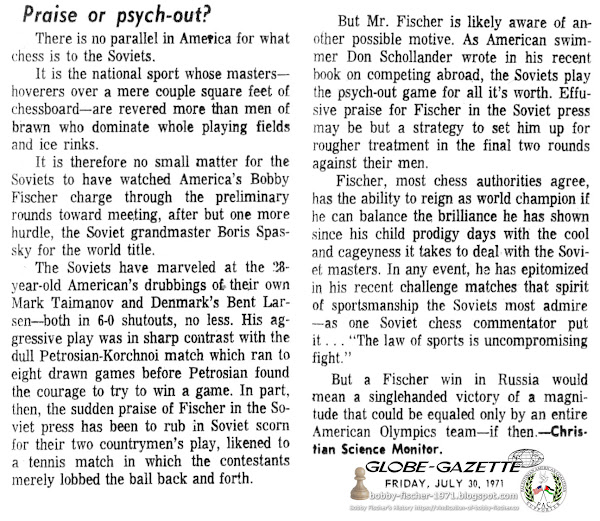Globe-Gazette Mason City, Iowa Friday, July 30, 1971 - Page 3
Praise or Psyche-Out?
There is no parallel in America for what chess is to the Soviets.
It is the national sport whose masters—hoverers over a mere couple square feet of chessboard—are revered more than men of brawn who dominate whole playing fields and ice rinks.
It is therefore no small matter for the Soviets to have watched America's Bobby Fischer charge through the preliminary rounds toward meeting, after but one more hurdle, the Soviet grandmaster Boris Spassky for the world title.
The Soviets have marveled at the 28-year-old American's drubbings of their own Mark Taimanov and Denmark's Bent Larsen—both in 6-0 shutouts, no less. His aggressive play was in sharp contrast with the dull Petrosian-Korchnoi match which ran to eight drawn games before Petrosian found the courage to try to win a game. In part, then, the sudden praise of Fischer in the Soviet press has been to rub in Soviet scorn for their two countrymen's play, likened to a tennis match in which the contestants merely lobbed the ball back and forth.
But Mr. Fischer is likely aware of another possible motive. As American swimmer Don Schollander wrote in his recent book on competing abroad, the Soviets play the psych-out game for all its worth. Effusive praise for Fischer in the Soviet press may be but a strategy to set him up for rougher treatment in the final two rounds against their men.
Fischer, most chess authorities agree, has the ability to reign as world champion if he can balance the brilliance he has shown since his child prodigy days with the cool and caginess it takes to deal with the Soviet masters. In any event, he has epitomized in his recent challenge matches that spirit of sportsmanship the Soviets most admire—as one Soviet chess commentator put it … “The law of sports is uncompromising fight.”
But a Fischer win in Russia would mean a single-handed victory of a magnitude that could be equaled only by an entire American Olympics team—if then.—Christian Science Monitor
























